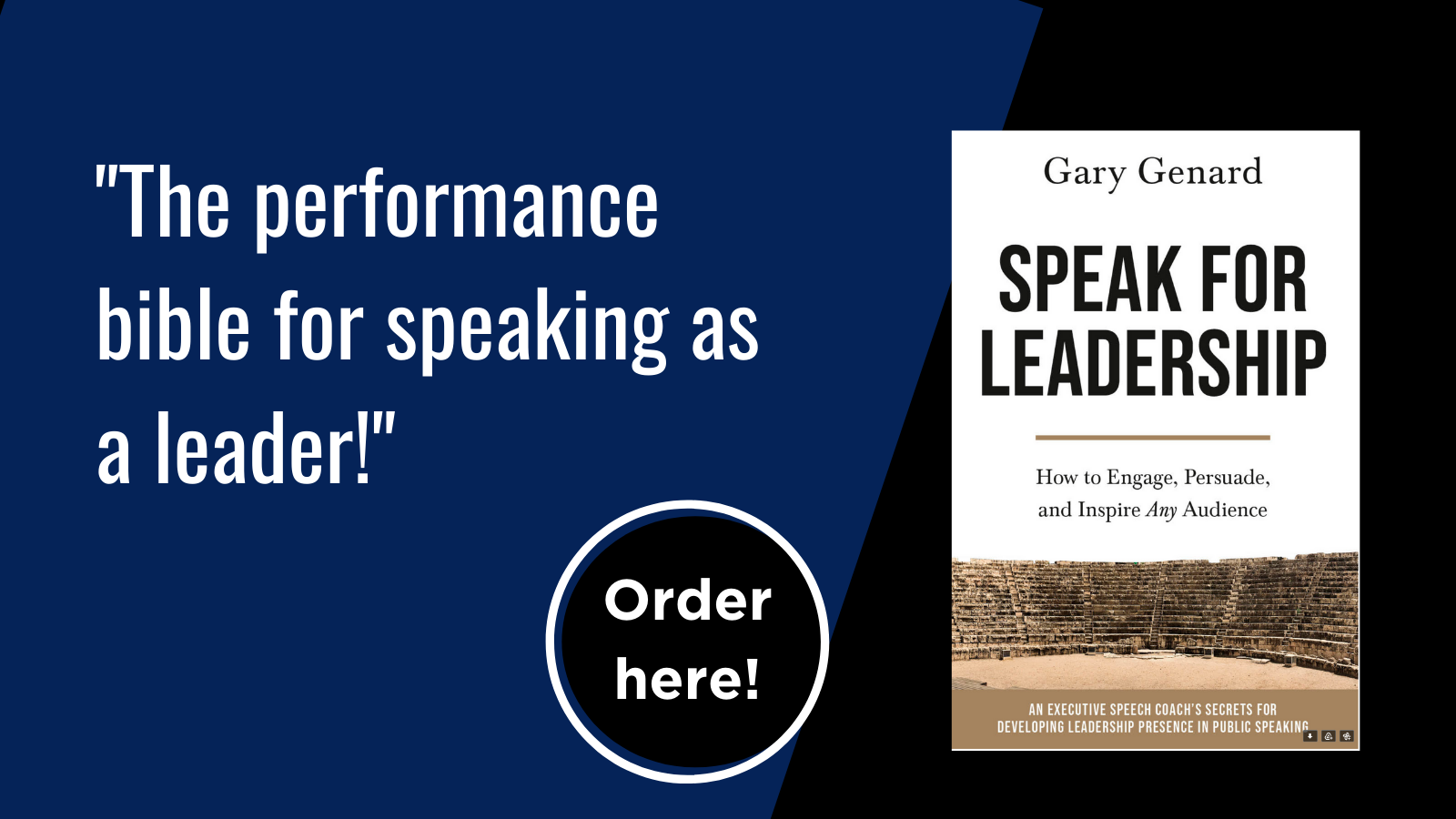Are you trying to make audiences like you more? That's not how it's done! Here's the key to achieving likability and influence with listeners.
"I want to come across as a nice person," my client said. "You know—to get the audience to like me."
My first thought was to imagine how much energy and focus that would take away from this person's real objective in his speech. And how it wouldn't help him be more likable at all, but probably the reverse.
Engaging and motivating audiences, however, is another matter entirely! Ready to be unforgettable? Download my Free cheat sheet, "5 Ways to Captivate an Audience."
And here, the actor's art is available to help my client, and any of us who feel that way. It teaches us how honesty and belief—and intention—are at the heart of genuinely moving audiences.
The Essential First Question Is: Do You Care?
Acting teaches us that belief is the first step to effective characterization. And often, it starts with what's called 'The Magic If': If I were this character in this situation, what would I do? (And included in that, of course, would be 'how would I feel,' 'what would I be thinking,' etc.)
In other words, the actor can't be focused on the outward show of things—the brilliance of the performance. To do that would be to focus on the external, so that the end product would be artificial and meretricious. True belief, on the other hand, results in a performance that's organic and true. If you really believe (at that moment, as the character), that this is happening in the life of this character, your reactions will not be studied, but spontaneous. Truth is at the very heart of the theatrical artifice.
Want to build this kind of credibility and trust? Get my Free ebook, 12 Easy Ways to Achieve Presence and Charisma.
To adapt all of this to your speeches and presentations: If you don't really care about meeting listeners' needs, why would any part of your performance be real or likable? The actor "trying to be good" will be bad; and the speaker trying to be likable will appear calculating.
Are You Living in the Audience's World?
If you really do care, the next step in connecting with the audience is to live in their world. Since part of doing this involves shaping your message in terms listeners can relate to, it should begin in the conceptual stage of your talk, not just in performance.
And for that process to be effective, you must understand your audience as well as you can, even in the planning stage of your speech. The stages go like this: conduct an audience analysis so you become aware of your listeners' needs concerning this presentation. Then decide on your specific purpose in giving this speech: what you want your audience to think, feel, or do as a result of your having spoken. Only now are you ready to decide on what content to bring in that will allow you to accomplish that purpose.
Learn more about motivating and inspiring audiences to lead in your industry! Download my Free White Paper, 7 Key Components of Successful Presentations.
This means that your presentation will have a unique shape and "feel" to it, based as much as possible on this audience's needs. In other words, if you enter the audience's world to take them on a journey, EVERYTHING you say will resonate, and presumably, appeal to them.
Don't Just Say It . . . Feel It, and Show It!
Finally, it's not good enough to know all of this, and to be this prepared, if you aren't willing to open up to listeners. And part of that means showing what you're really feeling.
The words you're saying aren't enough. We all know from politics, media, advertising—and for the past two years, the healthcare and medical bureaucracy—that words used for effect and manipulation are meaningless. (We're back to the question above, aren't we: Do you care?)
Your voice is an essential part of speaking with the sound of honesty! Learn more in my Free Tips and Tricks Guide, 5 Ways to Improve Your Voice as a Professional.
So, truth and caring belong at the starting gate, but coming up fast on the outside in the race, is externalization. And by this I mean, do you show what you feel, not just say it? This is also where actors can show us the way, as they are expert at using voice, body language, gestures, facial expressions, and movement on the stage itself to let us see what their characters are all about. In public speaking, too, it's not enough to think and feel deeply; you must use your instrument—yourself—to bring what you're saying to life.
Think hard, then, and practice speaking with true emotion, intention, and immediacy. Your audience needs to see and hear that you really mean it. (Screen-record or videotape yourself!) If you can do that in service of your effort to meet the needs of these listeners, you will indeed come across as likable.
Want to know more about connecting with and inspiring listeners? Get my new book about succeeding in-person and virtually, Speak for Leadership. Order below!
You should follow me on Twitter here.
Gary Genard is an actor, author, and expert in public speaking training and overcoming speaking fear. His company, Boston-based The Genard Method offers live 1:1 Zoom executive coaching and corporate group training worldwide. In 2022 for the ninth consecutive year, Gary has been ranked by Global Gurus as One of the World’s Top 30 Communication Professionals. He is the author of the Amazon Best-Seller How to Give a Speech. His second book, Fearless Speaking, was named in 2019 as "One of the 100 Best Confidence Books of All Time." His handbook for presenting in videoconferences, Speaking Virtually offers strategies and tools for developing virtual presence in online meetings. Contact Gary here.




